
Fall, 2020 – Volume 60, Issue 3
Editor, Ada Sinacore, Canada; Production Editor Merry Bullock USA/Estonia
Table of Contents
ICP2020-VIrtual
- Registration and Program
Renew your ICP Membership
- Renewal is easy and valuable!
Greetings from the Board
- Nominations and Reflections Update
- Reflections from Ana Guil, President 2019-2020
- Thank You to Ana Guil
- Greetings from ICP Interim President, Josephine Tan
- Secretary-General’s Message
- Treasurer’s Report
ICP Response to COVID-19 Update
- 2020 Survey on the Pandemic – Report from Austria
- Webinars – COVID and vulnerable populations
ICP News / Activities
- December 10, 2020 – Launch of Global Network of Psychologists for Human Rights (GNPHR)
- Global Psychology Alliance
- Call for Service – Volunteer with ICP!
ICP at the United Nations
- ICP and the PCUN
- ICP signs on to Statement from Vienna
Announcements
- Scholarship in honor of Jean Lau Chin
- Call for Papers – Special Issue International Journal of Social Psychology
Member’s News and Comments
- In Memoriam – Paul Lloyd
- Notes from Australia – Remembrance Project and ICP Regional Conference
Students’ Corner
Message from the Editor

ICP2020-Virtual
December 11-13, 2020
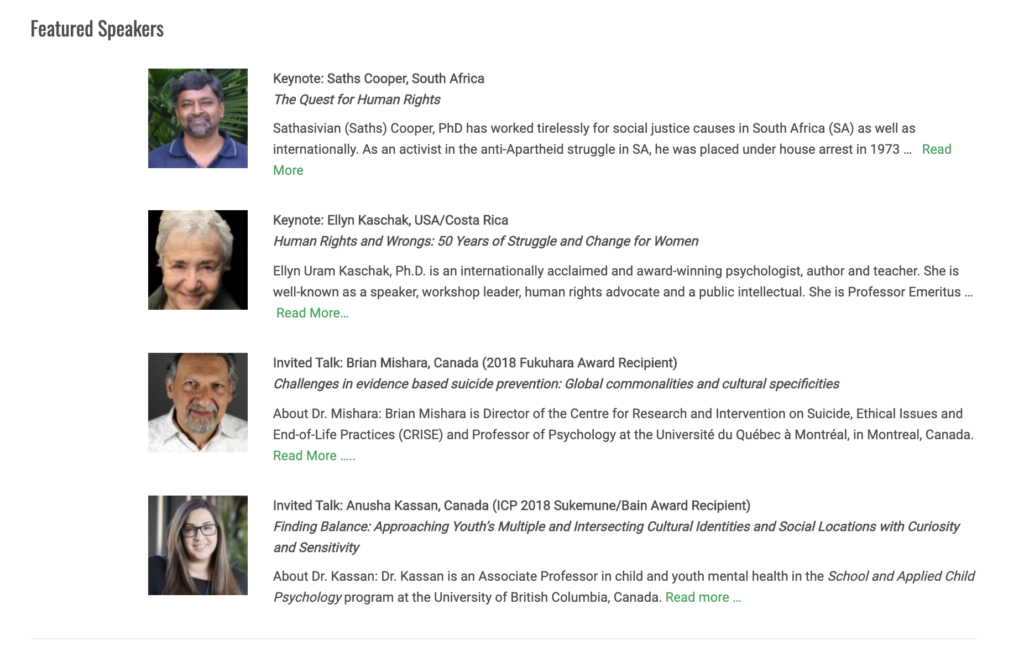
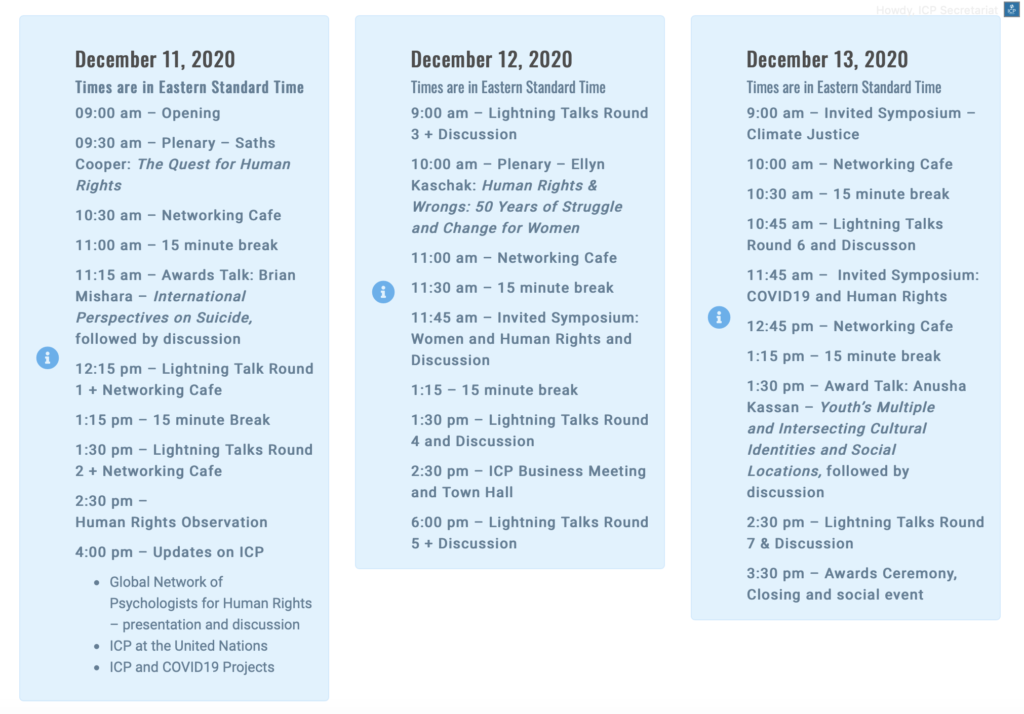
Register Now –
ICP Members $10 Professionals / $5 Students
NonMembers $30 Professionals / $10 Students
Renewing is Easy!

Just Click HERE to go straight to the membership renewal page. You can pay via credit card on the online portal.
See the Membership Brochure Here
See Membership benefits, rates here
Nominations and Elections Planning Update
Natalie Porter, Past President
 Several changes were made in this year’s nomination and election cycle as a result of the shift of this year’s annual conference to December and the pandemic. The Board of Directors approved postponing elections for one year. A call for elections will go out in January of 2021 and elections will be held in the spring.
Several changes were made in this year’s nomination and election cycle as a result of the shift of this year’s annual conference to December and the pandemic. The Board of Directors approved postponing elections for one year. A call for elections will go out in January of 2021 and elections will be held in the spring.
The proposal was made that Ana Guil serve as President until December 2020, an 18-month term, passing the gavel to Josephine Tan at that meeting. Josephine would then serve until the summer meeting of 2022, also an 18-month term, to avoid her serving only a 6-month term. We would then be on back on track coordinating the conference/annual meeting with the election cycle. The Board was contemplating this change, when COVID-19 hit; the conference was made virtual, and organizations were in a state of flux. Several organizations postponed elections for a year, and the Board followed suit. It voted to extend the terms of the President, Treasurer, and one Director until the summer of 2022. The elected officers in these roles had agreed with the plan and extension of their terms.
This election schedule would synchronize the election of Directors so that the same number would be up for election each year. Extending the term of Andrew Simon for one year helps to regularize subsequent election cycles to have 3 elected each year.
Ana Guil, current President, resigned during the summer, having served valiantly for more than her year’s term. Josephine, as President-Elect, has stepped into her position, per the Bylaws. She will serve out the remainder of Ana’s term until December as Interim President and assume her official Presidential role at the virtual conference. I want to thank Ana Guil for her hard work on behalf of ICP, her leadership as President as well as in coordinating the unforgettable annual conference in Càdiz.
Two Colleagues Join ICP Board
Dr. Chris Mulchay and Erinn Cameron have joined the ICP Board. Dr. Mulchay joins to complete the term of Director left open when we lost Dr. Jean Lau Chin. He is a clinical psychologist living in North Carolina, and specialized in ADHD, learning disorder, and custodial evaluations (see Treasurer’s report for longer bio). Erinn Cameron joins as the second Student Representative to the Board. Erinn will be in her last year at Fielding Graduate University. Originally from Scotland, she now lives on Whidbey Island in Puget Sound in Washington State, USA. Her dissertation focus is on climate justice.
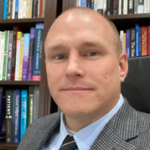
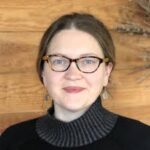
Reflections – Ana Guil, President 2019-2020
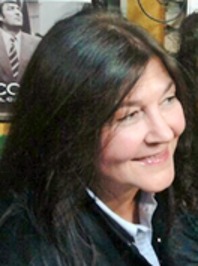 After a little more than a year as President of the ICP, I must first thank again those who placed their trust in me, and II will make some brief reflections on the experience.
After a little more than a year as President of the ICP, I must first thank again those who placed their trust in me, and II will make some brief reflections on the experience.
My main excuse for not having accepted to be president, when I was in line to do so, was my poor command of the English language. Indeed this challenge was my only problem. In the presidential transition, I must thank Natalie Porter for minimizing the formalities of the transfer of power ceremony and for coordinating the meeting of the incoming Board of Directors. However, because communication was in writing with time to translate it. I was able read the messeages so there was no problema. When communication had to be face-to-face or – later – through a telephone or computer, the difficulties of understanding were accentuated and communication became much slower.
This challenge is also one of the reasons why I have not been able to recruit more people from the Spanish-speaking community into our ranks. Although I think that the main problem for this has been the cost of our fees, together with the high price of attending our annual meetings (registration, travel and accommodation), which is excessive for the salaries of a large part of the Latin American population.
One of my greatest satisfactions, was the organization of the 77th Annual Conference of the ICP in Cadiz (Spain), with the help of my research group and the excellent support of the University of Cadiz and also, with the help of our secretary Merry Bullock.
Currently I am coordinating -together with my sister Rocio, professor at the University of Cadiz- a publication in the International Journal of Social Psychology (https://www.tandfonline.com/doi/full/10.1080/02134748.2020.1786793) of a monograph on HUMAN RIGHTS, DIGNITY AND SOCIAL JUSTICE: FROM KNOWLEDGE TO ACTION, open to the entire scientific community. All of the articles in both Spanish and English, were presented not only in Cadiz, but also in many of the annual meetings of the ICP, because it seemed to me that they have not been published since 2012, when we jointly published the proceedings of the Seville and Washington Congresses (see publication in: http://grupo.us.es/generoysocdelcto/wp-content/uploads/2017/05/Celebrating-70-years-of-working-towards-Health-Peace-and-Social-Justice.pdf). The International Journal of Social Psychology, like any scientific journal, has a set of rules and a system of peer review, which will select those papers that comply with all the required standards and best fit the proposed topic. Soon we will call for articles through the ICP website which, in principle, I think may be free of charge neither for the ICP, nor for the authors of the various articles.
The last issue I have to address is the nominations for the presidency of the ICP -after the presidency of Josephine Tann- since in our statutes this is one of the functions of the Past Presidents. I believe that those who accede to the presidency of the ICP have to be people willing to serve our association without getting anything in return, except the friendship of its members and the honor of having served our international community of psychologists, which is no small thing. It has been a pleasure!
Español: Tras algo más de un año de Presidencia del ICP, debo en primer lugar volver a agradecer la elección a quienes depositaron su confianza en mí, para a continuación, pasar a reflexionar sobre la experiencia vivida.
Mi principal excusa para no haber querido ocupar el cargo cuando me lo propusieron con anterioridad, fue siempre mi falta de dominio del idioma inglés y –efectivamente- este ha sido mi único problema. En el relevo presidencial, debo agradecer a Natalie Porter que minimizara los formalismos de la ceremonia del traspaso de poderes y que coordinara ella la reunión de la Junta Directiva entrante. Porque mientras la comunicación fue por escrito y con tiempo para traducir lo leído, no hubo problema alguno, pero cuando la comunicación hubo de ser cara a cara o -posteriormente- a través de un teléfono u ordenador, las dificultades de comprensión se acentuaron y la comunicación se hizo mucho más lenta.
Esta es también una de las razones por las que no he podido reclutar para nuestras filas más personas provenientes de la comunidad de habla hispana. Aunque pienso que el principal problema para ello, ha sido el coste de nuestras cuotas, unido al alto precio de la asistencia a nuestros encuentros anuales (inscripción, viaje y alojamiento), excesivo para los salarios de gran parte de la población latinoamericana.
Una de mis mayores satisfacciones, fue la organización de la 77 Conferencia Anual del ICP en Cádiz (España), con ayuda de mi grupo de investigación y del excelente apoyo de la Universidad de Cádiz, a la que me unen lazos entrañables y también, con la ayuda de nuestra secretaria Merry Bullock.
En la actualidad estoy coordinando –junto con mi hermana Rocío, profesora de la Universidad de Cádiz- la publicación en la Revista Internacional de Psicología Social (https://www.tandfonline.com/doi/full/10.1080/02134748.2020.1786793) de un monográfico sobre DERECHOS HUMANOS, DIGNIDAD Y JUSTICIA SOCIAL: DEL CONOCIMIENTO A LA ACCIÓN, abierto a toda la comunidad científica y a todos aquellos artículos tanto en español como en inglés, presentados no sólo en Cádiz, sino también en muchos de los encuentros anuales del ICP, porque creo recordar que no se publican desde 2012, en que publicamos conjuntamente las actas de los Congresos de Sevilla y Washington (ver publicación en: http://grupo.us.es/generoysocdelcto/wp-content/uploads/2017/05/Celebrating-70-years-of-working-towards-Health-Peace-and-Social-Justice.pdf). La Revista Internacional de Psicología Social, como toda revista científica, tiene unas normas y un sistema de revisión por pares, desde donde seleccionaremos aquellos trabajos que -reuniendo todos los estándares exigidos- mejor se adapten a la temática propuesta. En breve haremos la llamada a artículos a través de la web del ICP que, en principio, pienso que podrán ser sin coste alguno ni para el ICP, ni para los autores de los diversos artículos.
El último tema que me queda pendiente son las candidaturas a la presidencia del ICP -tras la presidencia de Josephine Tann- ya que en nuestros estatutos ésta es uno de los funciones de los Pasados-Presidentes. Considero que quienes opten a la presidencia del ICP han de ser personas dispuestas a servir a nuestra asociación sin obtener nada a cambio, salvo la amistad de sus afiliados y el honor de haber servido a nuestra comunidad internacional de psicólogos, que no es poco. Ha sido un placer!!!
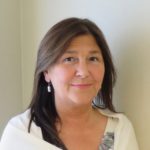
Thank you, Ana Guil
Natalie Porter, Past President
As Ana Guil-Bozal, PhD ends her term as President of ICP, it is fitting that we recognize her significant contributions to ICP over many years. Ana first served on the Board of Directors more than a decade ago; she hosted two ICP conferences in Spain, and she has contributed mightily to the feminist and international scholarship of the organization.
Ana’s commitment to a psychology that embodies social justice and feminism is apparent throughout her history with ICP. In 2012, she chaired the 70th Conference, “Celebrating 70 years of working toward health, peace, and social justice: Women and immigration in Sevilla. In 2020, she hosted the 78th Conference, “Human rights, dignity, and justice: From knowledge to action” in Cádiz. Both conferences highlighted activism and social justice movements as well as international scholarship on gender, immigration, health and well-being, and diversity. The conferences were also memorable in their showcasing of the cultural richness and beauty of southern Spain. Proceedings of the 2012 conference were published (Guil-Bozal, Ana; Comunian, Anna Laura; O’Roark, Anne. Celebrating 70 years of working towards health, peace and social justice. Arcibel. 2014), and Ana has secured funding from the University of Cádiz to publish proceedings from the 2020 conference.
Ana is a social psychologist and an EU Professor at the University of Seville. Her research has focused on women’s contributions to science, psychology, and technology and in exposing the barriers to women in their professional, scientific and technological roles. She leads the Research Group “Gender and Knowledge Society,” a group with research investigations on many facets of women’s lives. Ana has authored, or co-authored, 9 books, and 70+ chapters and journal articles on topics such as women and technology transfer, promotion in Andalusian public universities, the glass ceiling women in Spain, and sexism in educational institutions. Ana has also focused on women in Latin America, including guiding research investigations and theses in Colombia.
ICP recognized Ana for her important contributions. She received the Florence Denmark and Gori Gunwald Feminist Research and Service Award in 2012. Ana’s leadership is characterized by her warmth and inclusivity. She has made an indelible mark on ICP and on those of us who have worked for her. We thank her for her Presidency and work to date, and we look forward to her continued involvement.
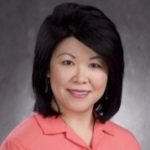
Interim President/President-Elect’s Message
Interim-President/President-Elect report – submission to ICP Newsletter 2020 Sept 30
Josephine Tan
This is my first Presidential column for the ICP. I have started as Interim President in light of Ana Guil’s decision to step down over the summer after having served one year as the ICP President (see Natalie Porter’s report on Elections and Nominations as well as her tribute to Ana Guil in this newsletter). Ana has made wonderful contributions to our organization, and we are fortunate that she remains with us as the Past President. Through the transition, the ICP operations remain robust despite the ongoing COVID-19 pandemic. The Board and committees “meet” regularly over zoom and work collaboratively on a number of projects. The report from the Secretary-General provides an excellent overview of the ICP activities, and detailed information about the various projects can be found in other reports in this newsletter.
I am truly excited about our first virtual ICP annual meeting that is scheduled for Dec 11-13 (see https://icpweb.org/icp-annual-conference/2020virtual/). This is a chance to share your work with our global membership! The fact that the meeting is entirely online means that you can participate from wherever you are, which makes it highly convenient and inexpensive. So please encourage your colleagues and students to take advantage of this unique opportunity to discuss and network on an international platform. We also have a lineup of exceptional invited speakers whose presentations are entirely accessible from your location. Paradoxically, the virtual format of the ICP2020 meeting has given us the opportunity to come together with greater ease even as we have to physically distance ourselves. Our hard-working ICP2020 planning and organizing committee members are (in alphabetical order): Irma Barron, Merry Bullock, Erinn Cameron, Thomas Chacko, Mary Beth Kenkel, Amina Muazzam, Chris Mulchay, Natalie Porter (Chair), Elison Santos, and Josephine Tan.
In April this year when the pandemic was still in its early stage, the Board recognized that the world and life as we know it would be changed significantly. It continues to change and where we will end up is a mystery. An ad hoc group (Chair: Josephine Tan) consisting of individuals with an interest in ICP response to COVID-19 decided to share ideas and collaborate on projects related to the pandemic by holding regular meeting over zoom. Projects to date include a special webinar series on COVID-19 and vulnerable peoples, an ICP Voices on the Pandemic set of video interviews with several ICP Board members, a pandemic survey developed by the Health & Wellness special interest group, a forthcoming webinar presentation on COVID and mental healthcare, a “building back better” blog, and a COVID remembrance stories project which started in Australia. Updates on the projects are posted on the ICP website (see https://icpweb.org/icp-projects-in-the-time-of-covid/). Current ad hoc group membership includes (alphabetical order): Naoki Asazuma, Merry Bullock, Elaine Congress, Florence Denmark, Machiko Fukuhara, Polli Hagenaars, Mary Beth Kenkel, Amina Muazzam, Sandra Neil, Ann Marie O’Roark, Roswith Roth, Élison Santos and Josephine Tan.
The ICP continues to deliver well-attended webinars on topics of interest to the membership (see https://icpweb.org/icp-webinars/), thanks to Merry Bullock and Andrew Simon. The webinars are free but you need to register for them. The next one was scheduled for October 29 (will be rescheduled because one of the speakers became ill with COVID-19) and offered as part of the COVID-19 & Vulnerable Populations special series (Chair: Elaine Congress). The focus will be on children during the pandemic and the distinguished speakers are Dr. Jan Kizilhan from Germany and Dr. Amina Abubakar from Kenya. Children are impacted by the pandemic but remain invisible in many ways. So please check out the webinar.
The Awards program (https://icpweb.org/awards/) continues to attract nominations of highly accomplished colleagues from all over the world. It is run by our very capable Awards Chair, Mary Beth Kenkel, who works with our very capable awards selection committee chairs: Naoki Asazuma (Fukuhara Award), Florence Denmark (Frances Mullen Award), Roswith Roth (Denmark-Gunvald Award), and Cecilia Cheng (Sukemune-Bain Award). We will be sending a call for the 2021 awards nomination with specified deadlines sometime in the next couple of months. Even so, it is not too early for you to reflect on whom you would like to nominate for the awards, and begin preparation of the nomination materials.
Andrew Simon is in charge of Membership and we are delighted to welcome new members (see https://icpweb.org/membership/). Membership has many benefits, and you will get to meet really great colleagues from different parts of the world, develop international collaborative networks, and expand the scope of what you are already doing. It is especially attractive for students and early career professionals. We have deliberately kept our membership fees low and stratified so that the ICP is affordable and accessible to everyone.
Our ICP representatives to the UN – Florence Denmark (New York), Roswith Roth (Vienna), and Anna Laura Comunian (Geneva) – make sure that we have current information of global relevance to inform our work. There will be some additions to our ICP representatives as there is so much that is going on in the international scene. You can get updates from https://icpweb.org/icp-un/. The ICP is proud to support issues relating to anti-racism, gender equality, anti-violence, climate change, and others, in collaboration with other NGOs, and will continue to do so.
The Global Network of Psychologists for Human Rights (see http://humanrightspsychology.org/) co-chaired by Polli Hagenaars and Merry Bullock serves a vital role for the discipline of psychology that is increasingly incorporating issues of human rights and social justice into its curriculum and activities. I urge you to check it out. The Global Network is unique in that it is an excellent resource for international networking and informational materials for psychologists who have an interest in matters of human rights.
All our activities could not be communicated to you on a regular basis without our creative ICP newsletter Editor, Ada Sinacore. The newsletter (see https://icpweb.org/icp-newsletter/) is a critical avenue of information distribution and keeps us connected and integrated as an organization with common purpose. It allows you to track of issues and activities that are relevant to you and your work, and perhaps it might spark an interest in you about increasing your involvement in the ICP. We definitely hope so.
The ICP is very fortunate to have a Board consisting of dedicated and talented individuals from different countries, and who are in different stages of their career from students to well-established professionals. Diversity promotes creativity, flexible thinking, and better decision-making. Our Secretary-General, Merry Bullock, is truly indispensable. She is our point person who knows all the ins and outs of the ICP. She is also very well-connected to the international psychology community, and her vast knowledge of the different network connections have helped to further our work many times.
Although much of the organization work is being done by the extended ICP Board and standing committees and ad hoc groups, there is plenty of opportunity for you to give us feedback, offer suggestions, let us know of your activities that are relevant to the mission of the ICP. If you have ideas, we are highly interested in hearing from you. Want to be more involved with the ICP? Get in touch with us. We very much want to have diverse representation. As you go through the newsletter, you will be able to identify who works on what projects, and you can get in touch with them directly. If you would like to start something new and think that it might fit with the mission of the ICP, let us know.
In conclusion, I hope that you and your loved one stay well and healthy. I also hope that you will take advantage of all the benefits that ICP membership offers you and feel free to get in touch with us with your ideas, suggestions, and feedback.

Report from the Secretariat
State of the ICP from the Secretariat’s point of view
Looking outside it is a typical, North American fall afternoon – the light alternates between warm sun and shadows and cooler overcast, flowers are sending out their last hurrah’s of color, and birds are raucously flying practice formations as they head south.
This colorful mélange of activities characterizes ICP as well. Like many organizations, ICP has been active in planning outreach to members and beyond, and in changing its own internal workings to accommodate the “new” realities of the pandemic. In a way, the pandemic has been energizing from an organizational perspective. ICP members have developed several new initiatives (you can read details in this issue of the newsletter), collaborated with new partners, and worked hard to maintain the essence of the organization: a focus on human rights, dignity and justice; and a commitment to mentoring, collaboration and international exchange.
Here is just a short recap:
- There are new ICP COVID-19 related projects. These include a video series with thoughts from some ICP Board members; a webinar series on Vulnerable Populations and COVID-19, and a Blog-commentary series to foster discussion on how psychology can contribute to “building back better” as we all emerge from this health pandemic. In addition, ICP is the host for showcasing some individual projects such as collecting a broad collection of reactions to COVID-19 from Australia and beyond. (see ADD LINK)
- The ICP-cosponsored network Global Network of Psychologists for Human Rights developed web pages devoted to COVID-19 and human rights – to point out the human rights issues that are raised by or exacerbated by conditions of the pandemic and responses to the pandemic. The Network will launch officially in December 2020 (on Human Rights Way) but you can get a peek now at humanrightspsychology.org (and see how to participate)!
- And last, ICP is still holding its annual conference – but in an exciting online, virtual format. This is new and still a work in progress, but promises to three days of learning and discussion. The goal is to pair talks/lectures with open discussion forums, and all online! We hope everyone will join in December 11-13 to get to interact with ICP colleagues. We are especially excited because the online format means that psychologists and psychology students from all over the world can participate – there are no travel costs, and the registration fees are low and affordable. (see ADD LINK)
From the Secretariat’s perspective this is an exciting and active time – there are conference calls on the various ICP activities, new and old, a few times a week; conference planning is exciting as we collectively begin to implement plans for how to encourage something close to meeting new people in the hallway of a conference venue. It is also a time for reflection on how we can use the opportunities of increased (and only) online outreach and communication to showcase the opportunities for addressing human rights, dignity and justice through ICP membership and engagement.
The ICP Board meeting will be active this fall! All members who are interested are invited to attend as observers – see the listserv announcements. And of course remember – if you have any questions, or if you would like to be engaged with ICP activities in a committee or task force or interest group, please let us know at icpincinfo@gmail.com
Merry Bullock
ICP Secertary-General
ICP Treasurer’s Report
Nancy M. Sidun, PsyD, ABPP, ATR
This treasurer’s report will be short and sweet – bottom line, we are financially sound, and our monetary holdings remain consistent. There is also a slight promise of ending this year with an increased balance as having a virtual conference has allowed us to save some money. More importantly, our membership is growing. Historically the vast majority of our income has come from our membership dues. It is also my great pleasure to introduce our new members of the finance committee, Dr. Irma Barron and Dr. Chris Mulchay. It is very exciting as the finance committee has been dormant and with Drs. Barron and Mulchay coming onboard, the finance committee will be able to provide guidance and recommendation to the ICP board.
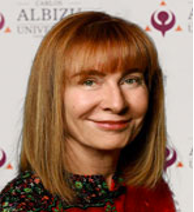 Irma M Barron, PhD lives in Miami Beach, Florida and is Professor and Practicum Coordinator in the Doctoral Program in Psychology at Albizu University, Miami Campus where she teaches couples and family systems psychology and is responsible for the external field placement of doctoral students, serves on the Middle States and APA Accreditation Committees. Dr. Barron is an Executive Board Member to the Domestic Violence Sexual Assault Council of Greater Miami (DVSAC); Florida Interest Network (FIN) of the American Association of Marriage and Family Therapists (AAMFT), and the Florida Family Research Network (FFRN) dedicated to the study of Bowen natural systems theory, and holds clinical memberships locally, nationally, and internationally. Professional presentations and publications are on Human and Sex Trafficking of Men, Boys, and LGBTQIA+, and climate change impacting marginalized and vulnerable persons in particular children and adolescents experiencing anxiety and depression. She is engaged in numerous outreach activities, and community service appointments providing years of pro bono community service to non-profit and grassroots organizations. Dr. Barron has provided international disaster crisis counseling. She is a certified chair yoga teacher and is fluent in English and Spanish.
Irma M Barron, PhD lives in Miami Beach, Florida and is Professor and Practicum Coordinator in the Doctoral Program in Psychology at Albizu University, Miami Campus where she teaches couples and family systems psychology and is responsible for the external field placement of doctoral students, serves on the Middle States and APA Accreditation Committees. Dr. Barron is an Executive Board Member to the Domestic Violence Sexual Assault Council of Greater Miami (DVSAC); Florida Interest Network (FIN) of the American Association of Marriage and Family Therapists (AAMFT), and the Florida Family Research Network (FFRN) dedicated to the study of Bowen natural systems theory, and holds clinical memberships locally, nationally, and internationally. Professional presentations and publications are on Human and Sex Trafficking of Men, Boys, and LGBTQIA+, and climate change impacting marginalized and vulnerable persons in particular children and adolescents experiencing anxiety and depression. She is engaged in numerous outreach activities, and community service appointments providing years of pro bono community service to non-profit and grassroots organizations. Dr. Barron has provided international disaster crisis counseling. She is a certified chair yoga teacher and is fluent in English and Spanish.
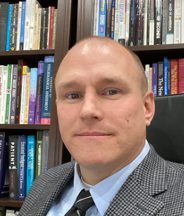 Chris Mulchay, PhD is a licensed psychologist in both North Carolina and Hawai’i. His practice focuses on three types of assessments: ADHD, learning disorders, and custodial evaluations. Dr. Mulchay moved to Asheville from Hawai’i, where he completed his postdoc. He was one of a small team of three professionals to establish clinics in rural areas of Hawai’i. They had a federal grant to conduct multidisciplinary evaluations for family court. Dr. Mulchay is honored to serve as a moderator for The Testing Psychologist, president for his local psychological association and as regional rep for his state psychological association. He is also proud to be on a few committees of the International Council of Psychologists. Outside of work, Dr. Mulchay enjoys spending time with his family and his two Australian Shepherds. He enjoys spending time on the water (surfing, paddling, swimming), hiking in the mountains or attending a concert.
Chris Mulchay, PhD is a licensed psychologist in both North Carolina and Hawai’i. His practice focuses on three types of assessments: ADHD, learning disorders, and custodial evaluations. Dr. Mulchay moved to Asheville from Hawai’i, where he completed his postdoc. He was one of a small team of three professionals to establish clinics in rural areas of Hawai’i. They had a federal grant to conduct multidisciplinary evaluations for family court. Dr. Mulchay is honored to serve as a moderator for The Testing Psychologist, president for his local psychological association and as regional rep for his state psychological association. He is also proud to be on a few committees of the International Council of Psychologists. Outside of work, Dr. Mulchay enjoys spending time with his family and his two Australian Shepherds. He enjoys spending time on the water (surfing, paddling, swimming), hiking in the mountains or attending a concert.
2020 Pandemic Research Project: A short Report from Austria
Roswith Roth, University of Graz, Austria
A group of ICP members built an Interest Group and is working on a 2020 Pandemic Research Project: Machiko Fukuhara, Japan; Ann Marie O’Roark, USA; Florence Denmark, USA; Ana Guil, Spain; Roswith Roth, Austria; Sandra E. S. Neil, Australia; Naoki Asazuma, Japan. We developed a short questionnaire to get a rough impression how the Covid-19 pandemic impacts ourself, our community, and the world.
I am member of an emergency phone group, organized by the broadcast OE3 and the red cross in Austria. We get telephone calls from people who feel lonely, desperate, distressed, depressed, anxious, suicidal, experienced severe life events or daily hassles, are ill or have chronic diseases.
Our group consists of 24 women, 7 men. All have or had employment in social areas and we received training on how to deal with clients who are anonymous, we have only once on the phone. Some of our clients use to call every day, so we know them by voice and stories they are telling.
I was able to interview seven female members of the group, age range 46 – 65 years, some are retired, some are still working – the telephone service is honorary and unpaid.
Figure 1 shows the three questions we asked about the impact of the pandemic. They could also add some notes explaining their responses.
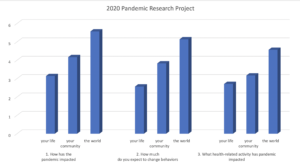
Question 1: our results show that the group feels still positively (M=3.14) about the impact of the pandemic for themselves, but rising negatively for the community (M=4.17) and for the world (M=5.57). Some comments mentioned positive aspects related to our climate crisis: we have less traffic, better air and less crowding of people on the street. But most of responses contained negative impacts: people are dying, have not enough food, lost their jobs, don’t pay taxes, the economy goes down.
Question 2: We have a similar course like in question 1. For themselves the responders expect the changes of behaviors still for the better (M=2.57), for the community neutral (M=3.83), but for the world (M=5.14) rather changing for the worse. On the one hand we try to buy regional food and products, what leads to positive experiences, on the other hand the global economy goes down and evokes worries about money and jobs.
Question 3 is based on the hope that our health-related behavior will be rather positive than negative for ourselves (M=2.71) and for the community (M=3.17) and slightly negative for the world (M=4.57). Increased hygiene is mentioned as positive, washing hands, wearing masks, but social distancing is mentioned as burden.
To sum up, I interviewed a sample of rather elder women, in our group are no mothers with small children, so some problems e.g. home office and home schooling are not yet represented. Other samples will follow.
ICP Activities
Launch of the Global Network of Psychologists for Human Rights
Psychology matters in Human Rights – Human Rights matter in Psychology
A new global network for psychologists interested in the intersection of psychology and human rights will be launched on the UN International Human Rights Day, December 10, 2020. The Global Network of Psychologists for Human Rights (GNPHR) aims to promote a human rights based and inclusive psychology.
The website http://humanrightspsychology.org/ is a joint initiative of the ICP and the Board Human Rights & Psychology of the European Federation of Psychologists’ Associations (EFPA, http://human-rights.efpa.eu/). This site contains articles and information related to human rights and psychology including regional news, a regular newsletter, and op-ed pieces and commentaries (“blogs”). So far, the following topics are developing: Covid 19, Climate Change, Human Rights Education for Psychologists, LGBTQI+, Migration/ Displacement, Personal Data and Data Rights, Youth, Racism.
The ICP hosts the website, with editorial oversight from an international steering committee, co-chaired by the ICP and the EFPA Board Human Rights and Psychology. An advisory council with broad global representation also has been appointed. The Steering Committee and Advisory Council will work to provide information and knowledge about diverse aspects of human rights and psychology and their applications, stimulate discussions and opinions, and promote the active engagement of psychologists in human rights protection.
The Network invites subscribers!!! These may be individuals or relevant professional associations, both human rights-oriented and psychological. In addition to to finding resources and exchanging information, the network will also support colleagues working in situations where human rights are under pressure, and will report when human rights are violated. With its global perspective, the GNPHR gives an opportunity for the exchange of multiple perspectives on research findings and good practices. Network members are encouraged to help build the network by contributing relevant academic or media-related articles, or by contributing an opinion piece or commentary.
To join the Network: http://humanrightspsychology.org/subscribe-to-gnphr/
To contribute with an article or a commentary: http://humanrightspsychology.org/contact/
Global Psychology Alliance
Report from Merry Bullock, Secretary-General
The Global Psychology Alliance is an outgrowth of a summit held in 2018 in Lisbon, Portugal on Psychology and Global Health with a focus on climate change. Organizations represented at that meeting (over 40 national and international psychology organizations) began to meet regularly since March – initially focused on COVID 19 and now focused on COVID-19, global mental health, and climate change. ICP has been represented by its Secretary-General in these meetings (the goal is to have those attending the meetings be conduits to their organizations). The Alliance has a web site, hosted by APA: https://www.apa.org/international/networks/global-psychology-alliance
Past accomplishments:
- Proclamation on 60 psychological associations working on climate change
- Action sheet against home-based violence (https://www.apa.org/international/global-insights/home-based-violenceavaialble in 26 languages)
- Statement: What do psychologists offer humanity (https://www.apa.org/international/global-insights/world-needs-psychology available in 19 languages)
Recent events:
- The group received a name (Global Psychology Alliance)
- Resources include a google drive with all documents and translations from member associations
- Working groups developing information on: care for frontline workers (stress management); “cookbook” for global mental health; education for psychologists; survey on climate change effects, knowledge and actions by psychology organizations around the world
CALL FOR SERVICE – VOLUNTEER WITH ICP!
Are you interested in being more involved with ICP and contributing to its mission and activities? Please volunteer for one of the open positions below:
- Member, Finance Committee. Requirements: ICP member with some experience in financial forecasting or investment. Duties are to serve with the Treasurer (chair), President and Past President to review the ICP budget and monthly statements, make recommendations regarding investments outside the annual budget, and develop and review an investment plan.
- Chair, Publications and Communication Committee
This is a re-constituted committee for ICP. The duties of the chair are to review current publications (newsletter, website, social media, occasional books), constitute a committee that will include the editors of present media outlets, and include others to develop a consistent outreach and information profile for ICP.
For more information or to volunteer, please contact the ICP Secretariat at icpincinfo@gmail.com
*****
ICP and PCUN (Psychology Coalition at the United Nations)
The Psychology Coalition at the UN (PCUN) consists of many psychological associations affiliated with the United Nations, including ICP. Others include the Society for the Psychological Study of Social Issues (SPSSI), theAmerican Psychological Association (APA), The international Association of Applied Psychology (IAAP), the Institute for Multicultural Counseling and Education Services (MES), and many others from all over the globe.
The PCUN meets every month. When the PCUN met on Thursday September 24th 2020, I was impressed by all the ICP representation present at the meeting. The PCUN president is Leslie Popoff, ICP representative to the UN. Elaine Congress, ICP Board member is PCUN secretary, Harold Takooshian, long time ICP member is PCUN treasurer, and Elaine Olaoye, ICP representative is PCUN assistant treasurer. Also, the PCUN Executive Committee includes past ICP president Florence Denmark. Others who attended the PCUN meeting were Janet Sigal and Liz Kloner, ICP UN representatives, and ICP interns Anna Stauber, and Natalie Pederson. Three students of the Psychology at the UN class taught by Florence Denmark and Richard Velayo at Pace University also attended, Kristina Kovacs, Megan Leon, and Jisun Kim.
The PCUN has launched new initiatives to meet its mission statement of collaborating in the application of psychological principles, science, and practice to global challenges of the UN agenda. These initiatives consist of new committees dedicated to outreach, programs, and advocacy. The outreach subcommittee will focus on establishing and strengthening an extended network within the NGO community and among psychology organizations. The program subcommittee will help spread the message and get engagement from various speakers and participants around the world. The advocacy subcommittee will work to write statements addressed to various UN structures in an effort to ensure that the voice of psychology is heard as a part of the UN agenda. Along with this year’s ICP interns, many of whom are students that participated last year, all members of PCUN are being encouraged to join a subcommittee in hopes of engaging more members and strengthening our coalition.
Additionally, with the PCUN meetings continuing to be held virtually in the foreseeable future, we expect to host international participants at a previously impossible volume. At the September 24th meeting there were members calling in from the US, Canada, Denmark, South Africa, France, Australia and many more. To those of you who tuned in from far away, we welcome you. Virtual meetings will continue to allow members from all over the globe to join forces and advocate for the lofty goals of the PCUN. We are so excited to welcome all our new and renewing members, both at the international and local level, and can’t wait to work with you.
ICP joins other NGOs around the world to sign on to a letter to the Commission on
the Status of women to support the rights of women, especially during COVID-19
In the letter, ICP and other organizations called on all UN Member States to support a number of points:
- Ensure that women and girls in all their diversity are able to enjoy and exercise their full human rights, including the right to participate in making decisions that affect their lives, free from violence and discrimination;
- Enact policies and commit funds to enable women’s full participation in public life, including: elimination of all discriminatory laws, structural barriers, social norms and gender stereotypes; strengthening institutions to promote gender equality; providing child care and parental leave to enable the redistribution of care work in households; recognizing the value of women’s unpaid care work in gross domestic product or income account indicators;
- Implement social protection measures, wage subsidies and care services to counter the gender-specific impacts of the COVID-19 pandemic, and support women in the informal economy and women entrepreneurs;
- Eliminate all forms of gender-related violence including but not limited to femicide and rape as a weapon in conflicts, and mitigate the adverse impacts of conflicts on women and girls;
- Address harmful social and cultural norms that normalize violence against women, and exercise zero tolerance for gender-based violence;
- Increase funding for support services for victims of gender-based violence and strengthen services for survivors;
- Provide access to quality education and training for women and girls, as education is fundamental to women’s full and effective participation and decision-making in public life;
- Close the gender digital divide to ensure that women and girls can participate equally with men and boys in distance learning and contribute to and benefit from technology and innovation;
- Provide equal access to digital tools and teacher training to ensure that distance learning does not broaden existing inequalities;
- Enhance collaboration with civil society to create safe spaces for women and girls to exercise their voice and leadership and ensure enjoyment of their human rights;
- Support, protect and fund women’s organizations and women’s human rights defenders who provide services and exercise community leadership at the grassroots level;
- Involve women’s groups and leaders meaningfully in all peace negotiations and peace-building efforts to increase the likelihood that conflicts will be resolved and communities restored;
- Reduce military expenditures and increase investments in health care, education and social protections, particularly for women and girls;
- Mobilize women and men, girls and boys, to work together in intergenerational partnerships for human rights, equality, justice, peace and a sustainable environment;
- Recognize and ensure the value of including women’s perspectives in decision-making, to achieve more just and equal societies.
The statement ended with the reminder:
Each of us is ultimately only as empowered as the most vulnerable among us. The world is crying out for equity, empowerment, inclusion and justice for all. We must all work together to ensure that the voices of women and girls are included, heard and respected in all fora at all levels
Announcements
Scholarship in honor of Jean Lau Chin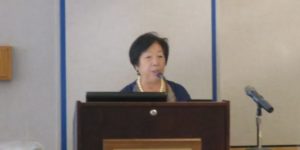
APA LIWP Jean Lau Chin Scholarship
In honor of Dr. Jean Lau Chin’s contributions and commitment to our discipline and profession, and in recognition of her research on global and diverse leadership, international psychology, diversity, and women’s issues, the APA Leadership institute for Women in Psychology (LIWP) is setting up a scholarship in her name. This scholarship was created with blessings from her sons, Scott and Stephen. It will be awarded annually through the American Psychological Foundation (APF) Dr. Dorothy W. Cantor LIWP Fund.
Jean was a former ICP President (2017-2018), and was a Director-at-Large (elected term 2019-2022) when she passed away from COVID in May, 2020. She was very active in the American Psychological Association and had served on many governance boards such as the Board of Directors, Council of Representatives, Council Leadership Team, and Board for the Advancement of Psychology in the Public Interest. She also served as the President of APA Divisions 35, 45, and 52. Additionally, she was the first Asian American to be licensed as a psychologist in Massachusetts, the first Asian American president of Division 35, and the first Asian American Advisory Committee and Teaching Faculty of LIWP. She was featured prominently in APA’s I am Psyched! multimedia exhibit. Equally important, Jean was distinguished as an educator, administrator, clinician, scholar and mentor. Many of us at the ICP who know and worked with her know of her kindness, generosity, helpfulness, and friendship. She was a wonderful human being.
ICP members can contribute to the scholarship in Jean’s memory by going to the website: https://cyberstore1.apa.org/cyb/cli/casinterface1/apf/?_ga=2.184971616.897834413.1595424979-1342946646.1594818168. In the block under the donation amount, “If this is for a particular fund please specify”, please write “In memory of Dr. Jean Lau Chin (LIWP scholarship fund).” If you are interested in making a larger gift, the APF has a pledge program which allows up to five years to fully honor pledges above $1,000 – please contact Dr. Debra Kawahara (dkawahara@alliant.edu, 858-635-4613) who is a member of the APA LIWP Advisory Committee, or Shalonta Bowman (shrbowman@apa.org) who is the APF contact person. Jean herself made a large gift to LIWP by making a pledge.
With your support, the first Jean Lau Chin Scholarship might be awarded to a member of the 2021 APA LIWP Class. As well, if you let Debra know, they can also add you to the program mailing list so that you can receive program updates about the Jean Lau Chin Scholar and next year’s Dr. Jean Lau Chin Memorial Address.
Submitted by Josephine Tan
Call for Papers
Note from Ana Guil
Dear colleagues!
CALL FOR PAPERS for a special issue in the International Journal of Social Psychology, dedicated to Human Rights and Social Justice. This would be an appropriate outlet for papers presented at the ICP Congress in Cadiz 2019, although the call is open to unpublished papers presented at other ICP Congresses and to papers on human rights by people outside the ICP. The articles can be written in Spanish or English. I encourage you to send your work as soon as possible, following the rules that you can find in the following link: http://bit.ly/Social_Psychology_Journal
Member News and Comments
AVE ETQUE VALE
Submitted by Ann Marie O’Roark
 PAUL J. LLOYD, PHD, ABPP
PAUL J. LLOYD, PHD, ABPP
May 15, 1941 – September 18, 2020
INTERNATIONAL COUNCIL OF PSYCHOLOGISTS (ICP)
Treasurer (1996-2000)
Executive Committee and Board of Directors (1996-2000)
Membership Chair (1996-1997)
SHARE Program, Chair (1989-2000)
Dr. Paul Joseph Lloyd, Distinguished Professor Emeritus of the University of Southeastern Missouri, loved to introduce himself as being from the only inland cape in the United States. During the nearly 50 years he lived in Cape Girardeau along the banks of the mighty Mississippi River, Paul traveled, consulted and offered leadership across the country and around the world. His contributions to psychology, to education and to colleagues, students, his local community and “silver city” airstream travelers he shared time with will be applauded in many places. Among International Council members he will be strongly remembered for his work with the board as Treasurer during a difficult period and his many years championing the SHARE program, an international consortium of psychological associations designed to facilitate professional contacts for psychologists traveling internationally (SHARE — Sharing Homes and Around the World Experiences). Paul made presentations at meetings of the International Council of Psychologists (ICP), the International Congress of Psychology (IAAP) and the International Congress of Applied Psychology in Kyoto, Tokyo, Brussels, Toronto, Amsterdam, and San Francisco. He was awarded the doctorate degree in 1978 from Saint Louis University and his primary professional interests included consulting psychology, psychosocial factors related to health and fitness, organizational development, occupational stress management, the psychology major and career alternatives.
Dr. Lloyd held numerous positions in the American Psychological Association (APA). including two terms on the APA Council of Representatives, chair of the Committee on Undergraduate Education, chair of the APA Fellows Committee and, until just two years ago, was an active member of CODAPAR, Council on Division and APA Relations. He held Fellow status in APA’s Society of the Teaching of Psychology, Society of Consulting Psychology, and Society of General Psychology, and was a Charter Fellow in Division of International Psychology.
He served as president of the APA Society of Consulting Psychology, the Society of Psychologists in Management, and as national president of PSI CHI for three terms (the national honor society in psychology). He was editor of Consulting Psychology Bulletin, APA Society of Consulting Psychology (1980—1988), The Psychologist-Manager Journal (1996—2001) and Missouri Psychologist, Missouri Psychological Association (1979—1982). Dr. Lloyd was 2010 College of Liberal Arts PRIDE Award recipient for excellence in scholarship, teaching and service to the University. In addition, he served leadership roles in Habitat for Humanity, Rotary International and Cultural Exchange Network (CENET). Paul and Karen Lloyd established the Paul J. Lloyd Endowed Psychology Scholarship through the Southeast Missouri University Foundation for undergraduate or graduate students with demonstrated interest in consulting psychology, positive psychology or the teaching of psychology at the college level.
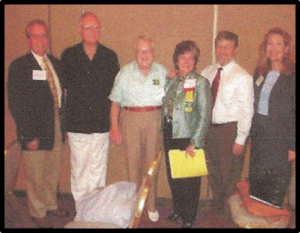
Paul is survived by his wife, Karen; daughter, Kimberly (Tyler) Reimann; son, Terry (Debbie) Ford; four grandchildren; and six great-grandchildren.
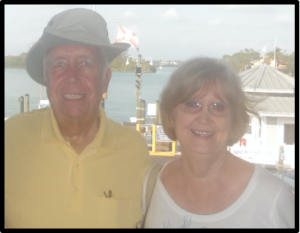
Notes on the Remembrance Project
Notes from Dr. Sandra E. Neil, PhD, FCCLP, FAPS, World Area Chair Coordinator, Chair of The Endangered People and Children Human Rights World Summits (Since 1983), Liaison Correspondent for ICP to the Australian Psycho;pgical Society, and the Founder of the ‘COVID-19 International Council of Psychologist (ICP) Remembrance Stories Project’.
I am writing to you from Melbourne, Australia where we have now been in the longest lockdown of any city in the world. We have been in stage 4 lockdown for 2 months, before that we were in stage 3, we are the only city in Australia under such strict rules. Due to the mishandling of hotel quarantine for returning citizens, the virus spread amongst the community igniting a second wave of COVID-19 here in Melbourne.
There are all kinds of binds and rules and regulations that people have to endure. There are no schools open, no retail, no hairdressers, no beauty salons. Only supermarkets, petrol stations and chemists are open, — restaurants and cafes are only open for takeaway. You cannot leave your 5km radius from your home, that includes shopping for essential items and exercise. You are not allowed to have anyone to your home. You have to wear a mask outside your home and keep your distance of 1.5 metres. Friends in aged care are not allowed visitors, they have been bound to their premises since March 2020. If you are one of the very few permitted workers, you have to carry a worker permit to show your eligibility to be out of your home.
We are all growing weary of the restrictions and rules and crave the social interactions with our loved ones and friends. This situation is like nothing we have ever endured before. It’s a repeat of the Spanish Flu of 100 years ago. We watched a program with Annabel Crabb wherein the conditions on the news reels of 1920-1921 were identical to the current pandemic here in Melbourne. For example, the nurses that volunteered during the Spanish Flu pandemic wore identical masks and they set up hospitals, called temporary hospitals exactly as they look today at the medical facilities in Melbourne. People were very troubled by funerals and the depression that occurred in the economy at that time in Australia.
I am finding the hardest part of our current situation is not being able touch our 9 grandchildren, some of whom are living in restricted circumstances in Barto, Pennsylvania and also a cousin living in the fire ravaged Northern California. We are becoming very restless in Melbourne as we continue to be immobilised by the rules in imposed by the government on families not being allowed to be together or touch. The angel of death has touched five of our closest friends and we haven’t been able attend funerals, except via Zoom.
This week we have turned the corner and the government has advised that in 3 weeks if all goes to plan that some of our restrictions will be lifted, we are finally starting to see the light at the end of tunnel.
The state-run politics over the handling of the pandemic in Melbourne draws a lot of questions and concerns in the community. In Australia voting is compulsory, unlike other countries around the world.
‘COVID-19 Remembrance Stories Project’
I have really enjoyed collecting the stories for the ‘COVID-19 International Council of Psychologist (ICP) Remembrance Stories Project’. In June 2020 we submitted Part One of the Project with seven stories from Australia. Part Two was submitted in September 2020 with 9 stories from around Australia (two from Newcastle, New South Wales). One of the stories was from a dual citizen of Australia and America who runs a kid’s summer camp in the USA ever year, this year ran the camp via Zoom from Australia and America. We also had one from France. You can read all of these stories on the ICP website at under ICP’s COVID-19 Activities.
I welcome submissions from ICP members and colleagues and plan to collect and submit ‘COVID-19 International Council of Psychologist (ICP) Remembrance Stories Project’ Part Three in December 2020. Please send to DrNeil@satiraustralia.com.
ICP Regional Conference in Japan ‘Human Rights, Social Justice, and Wellness from a Cross Cultural/Interdisciplinary Perspective, Friday 9th & Saturday 11th July 2021, Tokyo, Japan’.
‘Endangered People and Children Human Rights World Summit Friday 9th July 2021, Tokyo Japan’
We are still waiting to hear when our boarders will open to allow us to travel. We are still hopeful that the ICP Conference and the Olympics will go ahead as planned.
Respectfully Submitted
Dr. Sandra E. Neil, PhD, FCCLP, FAPS
 Thomas Chacko
Thomas Chacko
State University of New York, Buffalo
2019-2021
 Erinn Cameron
Erinn Cameron
Fielding Graduate Univesrity
2020-2023
Did you Know?
ICP now has two student representatives to the Board (Directors)! In the October 2020 board meeting, leadership ratified the appointment of Erinn Cameron as a second student member to the board.
Erinn Cameron (USA/Scotland) is a first-generation university student currently working on a Ph.D. in clinical psychology with specializations in social justice and neuropsychology at Fielding Graduate University. She lives on an island in the Salish Sea, where she enjoys eco-living in an intentional community, making music, cooking, and gardening with her family. Having lived in several countries and participated in academic and humanitarian work across the globe, Ms. Cameron brings international, cultural, and life experience to her work. Her ongoing research and clinical work focus on human rights, gender inequality, human trafficking, post-traumatic growth, and women’s health. She is the student chair elect 2021 for the APA Division 52 (international) board, and the campus representative for APA Division 35 (Women). Erinn has been an active student member of the International Council of Psychologists and is on the planning committee for the ICP 2020 Virtual Conference.
Dear Student Members of ICP –
We are delighted to see our student membership growing! We are looking forward to meeting many of you during our upcoming virtual conference in December.
Information about the conference can be found here: ICP Virtual Conference 2020
While the submission deadline for conference presentations has passed, there are others ways to be involved in the conference. If you are interested in volunteering to moderate a Zoom room during a session, please send a note to Erinn. We will have a short training toward the end of November. This volunteer activity can count as professional service for your CV and will be a great experience in preparation for other professional activities that you may encounter in your career.
Newsletter Opportunity
We would like to highlight student work and accomplishments this newsletter. This is another professional opportunity that would look great on your CV! If you are engaging in exciting research or have recently published a paper or project, we would love to hear about it and include it in the Student Corner of our newsletter. Please also let us know about any other professional accomplishments that you would like to share with our membership. Submissions should include a photo if possible.
Tell Your Friends!
For students across the globe, ICP provides a great opportunity to connect with each other and gain invaluable professional support from psychologists and others inrelated professions from around the world. ICP’s annual conferences and regional conferences provide opportunities to students to showcase their research to a global audience, to network. ICP’s focus on human rights, dignity, and justice , including a particular focus on diversity and intersectionality.
Currently we have around 35 student members from several countries.
Please reach out to us at ecameron@email.fielding.edu if you have any questions, thoughts, or ideas to share- or even to introduce yourself. We would love to hear from you. We will be in touch from time to time with more information regarding ICP and opportunities for student engagement.
Warmly,
Erinn Cameron, ICP Student Co-Director
Thomas Chacko, ICP Student Co-Director
Message from the Editor
Letter from the Editor
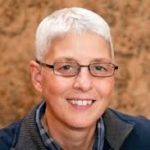 Dear Colleagues,
Dear Colleagues,
I hope this message find you well while we continue to live through these unprecedented and challenging times.
However, while times remain challenging I remain optimistic that things will improve in the not so distant future.
As such, I believe it is important to focus on the positive things that are going on currently, so we do not get stuck in the COVID-19 abyss. Thus, I have tried to continue to highlight the exciting and important work that ICP continues to do move forward, such as the new Jean Lau Chin Scholarship – an honor to recognize her life-long work. As well, we have an exciting virtual convention that will take place in December – Don’t forget to register!
At this time, I would like to thank Merry Bullock, who has been instrumental in the success of the Newsletter – as she has assisted with the web-platform, soliciting articles, and helping me to understand how to further develop the newsletter. The Newsletter would not be in its current format without Merry’s important contribution.
That said, If you have any comments or feedback please do not hesitate to contact me. I will continue to develop the Newsletter to meet the needs of the ICP membership. If you would like to submit something to the Spring Newsletter please send it to me by – April 30 – Submissions should be 500 words or less. Thank You.
In the meantime, I hope you are well and I look forward to seeing you at the convention in December.
All the best,
Ada
